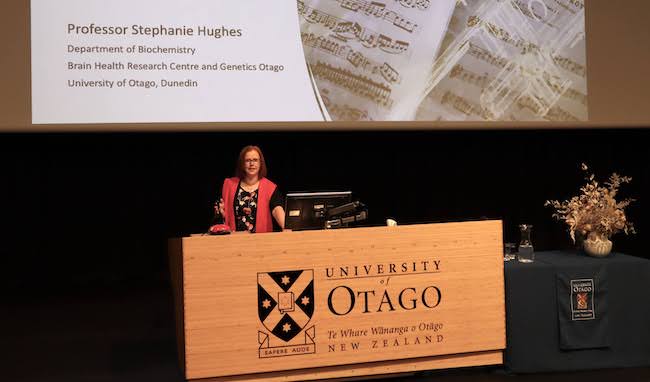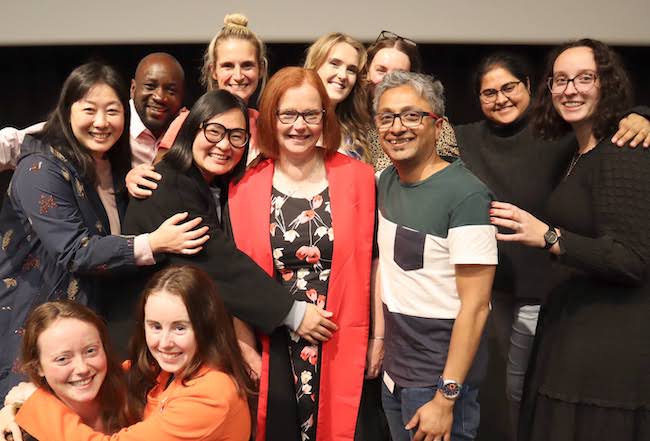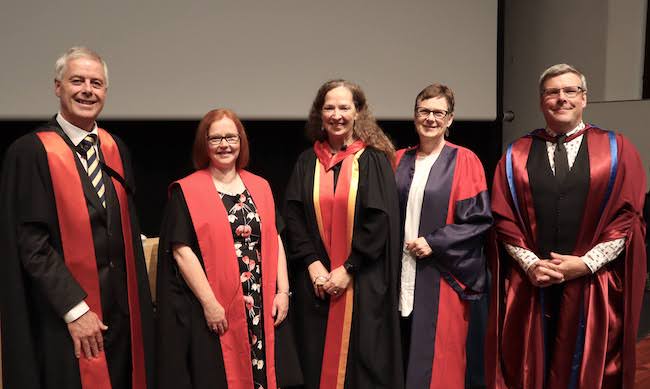Friday 28 April 2023 2:11pm

Congratulations to Stephanie Hughes who has been promoted to Professor on the back of her career-long devotion to understanding and finding a treatment for Batten disease, a rare, inherited, neurological degenerative disease.
She gave her Inaugural Professorial Lecture last week to a supportive crowd of friends, family and collegues, in which she described her career into research and her journey into the world of Batten disease.
Steph was brought up in the Northern suburbs of Wellington. Despite a strong, four-generation family tradition of land surveying, she followed her interest in science, sparked in primary school by an attentive teacher.
She started university life at Victoria University of Wellington with a view to studying maths and statistics, but biology called, and she completed her first class Honours degree in Genetics and Molecular Biology with a first taste of academic research investigating human chromosome instability.
Steph then decided to study for a PhD, and was first introduced to Batten disease when PhD supervisor Bill Jordon convinced her to investigate the disease's molecular causes.
Batten disease is actually a family of genetic diseases with mutations in one of 13 genes, all associated with very similar symptoms. Children with the disease are healthy at first, then between the ages of about 5 and 10 years, they start to develop vision problems, seizures, personality and behaviour changes, slow learning, clumsiness, or stumbling. The symptoms gradually get worse, leaving the children blind, bedridden and cognitively impaired. They usually die before they reach their late teens or twenties.
The name Batten was given to the disease after the physician who first described it (in English) in the early 1900s. The New Zealand research connection started when scientist Bob Jolly discovered sheep with very similar symptoms in the 1980s. These sheep had brain cells that looked very similar to those of humans with the disease – stunted cells with protein accumulating within the cells' recycling centres, known as lysosomes.
Steph began her PhD by comparing proteins from the livers of Batten disease sheep with those of normal sheep. However, she soon realized that growing sheep brain cells in lab dishes was necessary for a deeper understanding of the disease. She travelled to Britain to acquire this technique and returned better-equipped to observe the distinctions between normal and mutated cells with the disease. Her path into a career focused on Batten disease had begun.
After finishing her PhD in 1999, she moved to a postdoctoral position at the University of Iowa to learn about a new approach to treat genetic disorders – gene therapy.
The basic idea of gene therapy is to put a therapeutic gene (in this case a copy of the gene without a mutation) into a disabled virus, then use the virus to transfer that gene into the part of the body where the non-mutated gene is needed.
Steph learned how to make these viral vectors and carry out gene therapy in mice. After a few years in Auckland working on unrelated research, she secured a research group leader position at Otago in 2008, which allowed her to continue her Batten disease and gene therapy research and help to set up the Otago Viral Vector Facility.

Professor Stephanie Hughes (in red robe, centre), surrounded by some of her research team, both past and present.
Her research team since then has gone from strength to strength. They have successfully made gene therapy for a type of Batten disease known as CLN5 , and tested the viral vectors in cells in the lab, then mice, then in sheep. These trials have gone so well that they have recently progressed to trialling the therapy in children.
Steph has also introduced her research team to making human induced pluripotent stem cells in the lab – a much better model to work with in the lab than the sheep cells culture used originally. These human neurons can be used to develop many different models of neuronal disorders, including Batten disease and Alzheimer's disease, and can be used for high throughput screening of drugs and genetic therapies.
The progression of the Batten disease gene therapy to human clinical trials is partly due to Steph's excellent ability to collaborate with all sorts of other researchers locally and globally. She also works closely with the Batten disease community, and is in regular contact with children with Batten disease and their families from New Zealand and internationally.
Steph also leads many outreach initiatives that bring the excitment of neuroscience into schools and the community. One of the most recent projects that she has been involved in is the Brain Health Research Centre's 'Positively Wired' Programme, which works to improve the brain health and wellbeing of kids by teaching them about the relationship between brain activity and emotions.
Outside of work, Steph's beloved 'free time' family of pets keep her energised and happy, especially her precious dogs and the occasional baby alpaca to hand-rear.
At the conclusion of Steph's lecture, the Biochemistry Department Head of Department Professor Peter Dearden explained how deserved Steph's promotion is, and how proud the department is of her achievements, describing her as having “tenacity and clearsightedness”.
Ka mau te wehi Steph! Your work is awesome and we are lucky to have you with us!
A video of the lecture will be made publicly available in a few weeks' time on the University of Otago's YouTube channel:
Playlist: Inaugural Professorial Lectures – University of Otago

University leaders attending Professor Stephanie Hughes's Inaugural Professorial Lecture. From left, Professor Richard Blaikie (Deputy Vice-Chancellor, Research and Enterprise), Professor Stephanie Hughes, Professor Lisa Matisoo-Smith (acting Dean, School of Biomedical Sciences), Professor Patricia Priest (acting Pro-Vice-Chancellor, Division Health Sciences), Professor Peter Dearden (Head of Department, Biochemistry).
